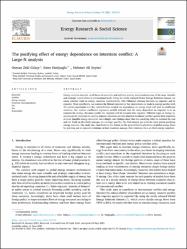| dc.contributor.author | Gökçe, Osman Zeki | |
| dc.contributor.author | Hatipoğlu, Emre | |
| dc.contributor.author | Soytaş, Mehmet Ali | |
| dc.date.accessioned | 2021-06-25T06:20:56Z | |
| dc.date.available | 2021-06-25T06:20:56Z | |
| dc.date.issued | 2021 | en_US |
| dc.identifier.citation | Gökçe, O. Z., Hatipoğlu, E. ve Soytaş, M. A. (2021). The pacifying effect of energy dependence on interstate conflict: A Large-N analysis. Energy Research and Social Science, 78. https://dx.doi.org/10.1016/j.erss.2021.102133 | en_US |
| dc.identifier.issn | 2214-6296 | |
| dc.identifier.issn | 2214-6326 | |
| dc.identifier.uri | https://dx.doi.org/10.1016/j.erss.2021.102133 | |
| dc.identifier.uri | https://hdl.handle.net/20.500.12511/7312 | |
| dc.description.abstract | Energy remains essential to all forms of economic and military activity and constitutes one of the most valuable and strategic commodities in international trade. Using the newly released Global Energy Relations Dataset, we assess whether trade in energy resources systematically affect bilateral relations between an importer and its exporter. More specifically, we contrast the liberal expectation that dependence on trade in energy pacifies with the realist expectation that the vulnerabilities created via dependence on energy trade will lead to conflictual relations. Our random coefficient regression models indicate that the more dependent an importer is to an exporter for energy, the more pacific the importer will be towards that exporter. Different types of energy resources pacify importers to varying degrees; importers are less reluctant to initiate conflict against their exporters of more fungible energy resources. Accordingly, our findings show that this pacifying effect is minimal for coal and oil. Trade in electricity emerges as a stronger pacifier. We find natural gas to be the most potent pacifying energy resource. Our study also contributes to the debate on the geopolitical implications of global energy flows by pointing out to regional variations in how countries manage their relations vis-à-vis their energy suppliers. | en_US |
| dc.language.iso | eng | en_US |
| dc.publisher | Elsevier Ltd | en_US |
| dc.rights | info:eu-repo/semantics/openAccess | en_US |
| dc.rights | Attribution 4.0 International | * |
| dc.rights.uri | https://creativecommons.org/licenses/by/4.0/ | * |
| dc.subject | Conflict | en_US |
| dc.subject | Economic Interdependence | en_US |
| dc.subject | Energy Security | en_US |
| dc.subject | Gas | en_US |
| dc.subject | Oil | en_US |
| dc.subject | Renewables | en_US |
| dc.title | The pacifying effect of energy dependence on interstate conflict: A Large-N analysis | en_US |
| dc.type | article | en_US |
| dc.relation.ispartof | Energy Research and Social Science | en_US |
| dc.department | İstanbul Medipol Üniversitesi, İnsan ve Toplum Bilimleri Fakültesi, Siyaset Bilimi ve Uluslararası İlişkiler Bölümü | en_US |
| dc.authorid | 0000-0002-5819-7841 | en_US |
| dc.identifier.volume | 78 | en_US |
| dc.relation.publicationcategory | Makale - Uluslararası Hakemli Dergi - Kurum Öğretim Elemanı | en_US |
| dc.identifier.doi | 10.1016/j.erss.2021.102133 | en_US |
| dc.identifier.wosquality | Q1 | en_US |
| dc.identifier.scopusquality | Q1 | en_US |



















